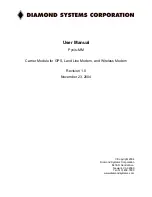
8 -
11
8.
DEBUGGING FUNCTION
NOTE
1) When a monitoring is performed with a monitor condition set, the file
displayed at the device running GPP function is monitored.
Make sure that the file name used with GPP function is the same as the file
name when monitoring is performed by executing "Newly from PLC".
2) When the buffer memory of a peripheral device is read by designating a
direct device, FFFF
H
is monitored if the peripheral device is faulty or not
connected.
3) When monitoring file registers, FFFF
H
is monitored if no file register
designation is made.
4) Before monitoring, make sure that the device assignment of the CPU and
GPP function agree.
5) For the local device monitor in each program file, the monitor operation
varies depending on presence of the CPU module function version B and the
GPP function model.
[Without function version B]
• Detailed conditions (step number and device condition) are set for each
program file to perform monitoring.
[With function version B]
• When the GX Developer and the SW2IVD-GPPQ are used, the local
device can be monitored in each program file by setting compatibility with
local device.(Refer to Section 8.2.2.)
• When SW0IVD-GPPQ and SW1IVD-GPPQ are used, the local device can
be monitored with the same operation as the operation without function
version B.
6) When monitoring the buffer memory of a special function module, the scan
time is prolonged in the same way as it is when a FROM/TO instruction is
executed.
7) Several people can perform monitoring at the same time.
The following considerations apply when executing this:
• High-speed monitoring can be made possible by increasing the system
area by 1k steps for each monitor for other station use when formatting the
built-in RAM.
In the monitor for other stations, 15k steps maximum can be set in the
system area and the corresponding file space for the user is reduced.
• Only one person can set the detailed conditions for monitoring.
8) The detailed conditions for monitoring can only be set in ladder monitoring.
9) If the same device is designated for both a monitor condition and monitor
stop condition, also designate the "ON" or "OFF" status.
10) When the step number is specified for the monitor condition, monitor
conditions are not satisfied for no execution of the applicable step instruction
as shown below:
• Applicable step instructions are skipped by CJ, SCJ and JMP instructions.
• The applicable instruction is the END instruction and the FEND instruction
exists in the program.
11) Do not reset the CPU module while the monitor condition is registered.
Summary of Contents for Q2ACPU
Page 1: ......
Page 2: ......
Page 221: ...12 12 12 OVERVIEW OF PROCESSING PERFORMED BY THE QnACPU ...
Page 222: ...12 13 12 OVERVIEW OF PROCESSING PERFORMED BY THE QnACPU ...
Page 237: ...12 28 12 OVERVIEW OF PROCESSING PERFORMED BY THE QnACPU MEMO ...
Page 271: ...16 13 16 POWER SUPPLY MODULE 4 Names and description of parts of the A66P ...
Page 343: ...21 21 13 MAINTENANCE AND INSPECTION 21 4 2 Replacement of the fuse for an output module ...
Page 357: ...22 12 22 TROUBLESHOOTING ...
Page 359: ...22 14 22 TROUBLESHOOTING MEMO ...
Page 429: ...App 32 APPENDICES Trigonometric function Classification Symbol Description ...
Page 537: ...App 140 APPENDICES REMARK 1 Message 1 An error code is displayed in 2 Alert 1 3 Alert 2 ...
Page 539: ...App 142 APPENDICES 2 Q2ACPU Q2ACPU S1 modules Unit mm inch ...
Page 541: ...App 144 APPENDICES 2 A66P power supply module Unit mm inch ...
Page 543: ...App 146 APPENDICES 3 A35B base unit 4 A38B A38HB A38HBEU base unit Unit mm inch Unit mm inch ...
Page 567: ...MEMO ...
Page 569: ......
Page 570: ......
















































